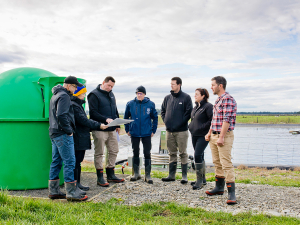MSA triumph
OPINION: Methane Science Accord, a farmer-led organisation advocating for zero tax on ruminant methane, will be quietly celebrating its first foray into fertiliser co-operative governance.
 L-R: Stuart Taylor (General Manager Farming, Craigmore), Professor Hong Di (Lincoln University), Carl Ahlfeld (Product Manager ClearTech & EcoPond, Agnition), Emeritus Professor Keith Cameron (Lincoln University), Elliot Mercer (General Manager Innovation, Agnition), Nikki Cameron (Operations Manager, Craigmore), Steven Melville (Business Manager, Glen Eyre Farm, Craigmore)
L-R: Stuart Taylor (General Manager Farming, Craigmore), Professor Hong Di (Lincoln University), Carl Ahlfeld (Product Manager ClearTech & EcoPond, Agnition), Emeritus Professor Keith Cameron (Lincoln University), Elliot Mercer (General Manager Innovation, Agnition), Nikki Cameron (Operations Manager, Craigmore), Steven Melville (Business Manager, Glen Eyre Farm, Craigmore)
Craigmore Sustainables is trialling new technology designed to reduce methane in effluent ponds, something the company claims is a first for the New Zealand dairy industry.
The company’s 400ha dairy farm Glen Eyre in Oxford, North Canterbury will adopt EcoPond, an effluent treatment system that removes almost all methane emitted from effluent ponds with an additive normally used in the treatment of drinking water.
The technology is the result of a collaboration between Ravensdown and Lincoln University.
Craigmore’s general manager of farming, Stuart Taylor says the company is striving to be a leader in the trial and adoption of new technology.
“Craigmore recognises that farming plays an important role in both contributing to and mitigating climate change and we have an ambition to materially exceed the targets set by the Climate Change Commission through land use change and changes to existing operations,” says Taylor.
He says the EcoPond technology could play a key role in supporting farmers to reduce methane and help New Zealand meet its climate change targets.
“EcoPond is an important trial for us because we are keen to apply innovative ways to the reduction of emissions and minimise environmental impacts.”
Iron sulphate treatment is highly effective in reducing methane emissions due to increased microbial competition for organic matter substrate due to the addition of sulphate and ferric ions.
This restricts the growth of the methane-producing microorganisms known as methanogens.
Initial tests undertaken in May tested the effluent from the effluent pond after it had been treated with iron sulphate through EcoPond. This showed a 95% reduction in CH4 (methane) which is highly significant.
Taylor says the technology is an example of the primary sector leading the world in reducing emissions and playing its part in addressing climate change.
“We have several sustainability programmes in place to ensure we strike a balance between respecting the environment and running a sustainable and profitable rural operation,” he says.
Earlier this year, EcoPond became part of the newly established Ravensdown entity, Agnition. Agnition’s mission is to get innovations on farm faster.
Agnition chief executive Jasper van Halder says EcoPond is an important part of the entity’s arsenal of technology and innovations, something he says will help quickly deliver practical and sustainable on-farm solutions for New Zealand farmers and growers.
“It’s great to see Craigmore take a leadership role and demonstrate what can be achieved with EcoPond technology,” he says.
“Partnerships and innovation are required in the sector. It’s hard to beat practical on-farm use to really demonstrate the EcoPond advantage and partners like Craigmore show us the future of farming.”
Farmer confidence has taken a slight dip according to the final Rabobank rural confidence survey for the year.
Former Agriculture Minister and Otaki farmer Nathan Guy has been appointed New Zealand’s Special Agricultural Trade Envoy (SATE).
Alliance Group has commissioned a new heat pump system at its Mataura processing plant in Southland.
Fonterra has slashed another 50c off its milk price forecast as global milk flows shows no sign of easing.
Meat processors are hopeful that the additional 15% tariff on lamb exports to the US will also come off.
Fears of a serious early drought in Hawke’s Bay have been allayed – for the moment at least.

OPINION: The release of the Natural Environment Bill and Planning Bill to replace the Resource Management Act is a red-letter day…
OPINION: Federated Farmers has launched a new campaign, swapping ‘The Twelve Days of Christmas’ for ‘The Twelve Pests of Christmas’ to…